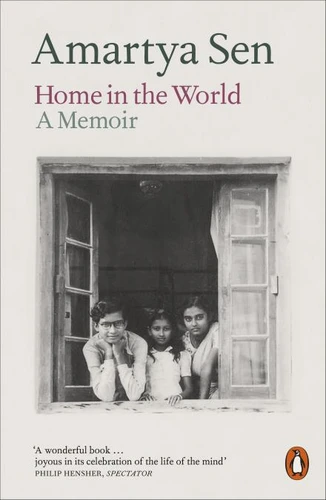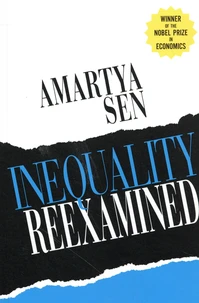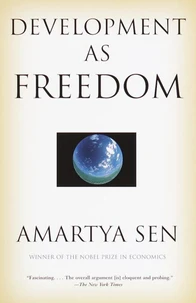Prix Nobel d'économie 1998
Home in the World. A Memoir
Par :Formats :
Disponible dans votre compte client Decitre ou Furet du Nord dès validation de votre commande. Le format ePub protégé est :
- Compatible avec une lecture sur My Vivlio (smartphone, tablette, ordinateur)
- Compatible avec une lecture sur liseuses Vivlio
- Pour les liseuses autres que Vivlio, vous devez utiliser le logiciel Adobe Digital Edition. Non compatible avec la lecture sur les liseuses Kindle, Remarkable et Sony
- Non compatible avec un achat hors France métropolitaine
 , qui est-ce ?
, qui est-ce ?Notre partenaire de plateforme de lecture numérique où vous retrouverez l'ensemble de vos ebooks gratuitement
Pour en savoir plus sur nos ebooks, consultez notre aide en ligne ici
- Nombre de pages480
- FormatePub
- ISBN978-0-14-197098-1
- EAN9780141970981
- Date de parution08/07/2021
- Protection num.Adobe DRM
- Infos supplémentairesepub
- ÉditeurPENGUIN
Résumé
The extraordinary early life in India and England of one of the world's leading public intellectualsWhere is 'home'? For Amartya Sen, home has been many places - Dhaka in modern Bangladesh, the little university town of Santiniketan, where he was raised as much by his grandparents as by his parents, Calcutta where he first studied economics and was active in student movements, and Trinity College, Cambridge, to which he came aged 19.
Sen brilliantly recreates the atmosphere in each of these. He remembers his river journeys between Dhaka and his parents' ancestral homes and wonderfully explores the rich history and culture of Bengal. In 1943 he witnessed the disastrous unfolding of the Bengal Famine, and the following year the inflaming of tensions between Hindus and Muslims. In the years before Independence, some of his family were imprisoned for their opposition to British rule.
Central to Sen's formation was the intellectually liberating school in Santiniketan founded by Rabindranath Tagore (who gave him his name Amartya) and exciting conversations in the Coffee House on College Street in Calcutta. In Cambridge, he engaged with many of the leading economists and philosophers of the day, especially with the great Marxist thinker Piero Sraffa, who provided a direct connection not only to Wittgenstein, but to Antonio Gramsci and the anti-fascist battles in Italy in the 1920s.
After years in Europe and America, the book ends when he returns to Delhi in 1963. Home in the World shows how Sen's experience shaped his ideas - about economics, philosophy, identity, community, famines, gender inequality, social choice and the power of discussion in public life. The joys of learning and the importance of friendship are powerfully conveyed. He invokes some of the great thinkers of the past and his own time - from Ashoka in the third century BC and Akbar in the sixteenth, to David Hume, Adam Smith, Karl Marx, John Maynard Keynes, Maurice Dobb, Kenneth Arrow and Eric Hobsbawm.
Above all, Sen emphasises the importance of enlarging our views as much as we can, of human sympathy and understanding across time and distance, and of being at home in the world.
Sen brilliantly recreates the atmosphere in each of these. He remembers his river journeys between Dhaka and his parents' ancestral homes and wonderfully explores the rich history and culture of Bengal. In 1943 he witnessed the disastrous unfolding of the Bengal Famine, and the following year the inflaming of tensions between Hindus and Muslims. In the years before Independence, some of his family were imprisoned for their opposition to British rule.
Central to Sen's formation was the intellectually liberating school in Santiniketan founded by Rabindranath Tagore (who gave him his name Amartya) and exciting conversations in the Coffee House on College Street in Calcutta. In Cambridge, he engaged with many of the leading economists and philosophers of the day, especially with the great Marxist thinker Piero Sraffa, who provided a direct connection not only to Wittgenstein, but to Antonio Gramsci and the anti-fascist battles in Italy in the 1920s.
After years in Europe and America, the book ends when he returns to Delhi in 1963. Home in the World shows how Sen's experience shaped his ideas - about economics, philosophy, identity, community, famines, gender inequality, social choice and the power of discussion in public life. The joys of learning and the importance of friendship are powerfully conveyed. He invokes some of the great thinkers of the past and his own time - from Ashoka in the third century BC and Akbar in the sixteenth, to David Hume, Adam Smith, Karl Marx, John Maynard Keynes, Maurice Dobb, Kenneth Arrow and Eric Hobsbawm.
Above all, Sen emphasises the importance of enlarging our views as much as we can, of human sympathy and understanding across time and distance, and of being at home in the world.
The extraordinary early life in India and England of one of the world's leading public intellectualsWhere is 'home'? For Amartya Sen, home has been many places - Dhaka in modern Bangladesh, the little university town of Santiniketan, where he was raised as much by his grandparents as by his parents, Calcutta where he first studied economics and was active in student movements, and Trinity College, Cambridge, to which he came aged 19.
Sen brilliantly recreates the atmosphere in each of these. He remembers his river journeys between Dhaka and his parents' ancestral homes and wonderfully explores the rich history and culture of Bengal. In 1943 he witnessed the disastrous unfolding of the Bengal Famine, and the following year the inflaming of tensions between Hindus and Muslims. In the years before Independence, some of his family were imprisoned for their opposition to British rule.
Central to Sen's formation was the intellectually liberating school in Santiniketan founded by Rabindranath Tagore (who gave him his name Amartya) and exciting conversations in the Coffee House on College Street in Calcutta. In Cambridge, he engaged with many of the leading economists and philosophers of the day, especially with the great Marxist thinker Piero Sraffa, who provided a direct connection not only to Wittgenstein, but to Antonio Gramsci and the anti-fascist battles in Italy in the 1920s.
After years in Europe and America, the book ends when he returns to Delhi in 1963. Home in the World shows how Sen's experience shaped his ideas - about economics, philosophy, identity, community, famines, gender inequality, social choice and the power of discussion in public life. The joys of learning and the importance of friendship are powerfully conveyed. He invokes some of the great thinkers of the past and his own time - from Ashoka in the third century BC and Akbar in the sixteenth, to David Hume, Adam Smith, Karl Marx, John Maynard Keynes, Maurice Dobb, Kenneth Arrow and Eric Hobsbawm.
Above all, Sen emphasises the importance of enlarging our views as much as we can, of human sympathy and understanding across time and distance, and of being at home in the world.
Sen brilliantly recreates the atmosphere in each of these. He remembers his river journeys between Dhaka and his parents' ancestral homes and wonderfully explores the rich history and culture of Bengal. In 1943 he witnessed the disastrous unfolding of the Bengal Famine, and the following year the inflaming of tensions between Hindus and Muslims. In the years before Independence, some of his family were imprisoned for their opposition to British rule.
Central to Sen's formation was the intellectually liberating school in Santiniketan founded by Rabindranath Tagore (who gave him his name Amartya) and exciting conversations in the Coffee House on College Street in Calcutta. In Cambridge, he engaged with many of the leading economists and philosophers of the day, especially with the great Marxist thinker Piero Sraffa, who provided a direct connection not only to Wittgenstein, but to Antonio Gramsci and the anti-fascist battles in Italy in the 1920s.
After years in Europe and America, the book ends when he returns to Delhi in 1963. Home in the World shows how Sen's experience shaped his ideas - about economics, philosophy, identity, community, famines, gender inequality, social choice and the power of discussion in public life. The joys of learning and the importance of friendship are powerfully conveyed. He invokes some of the great thinkers of the past and his own time - from Ashoka in the third century BC and Akbar in the sixteenth, to David Hume, Adam Smith, Karl Marx, John Maynard Keynes, Maurice Dobb, Kenneth Arrow and Eric Hobsbawm.
Above all, Sen emphasises the importance of enlarging our views as much as we can, of human sympathy and understanding across time and distance, and of being at home in the world.


















